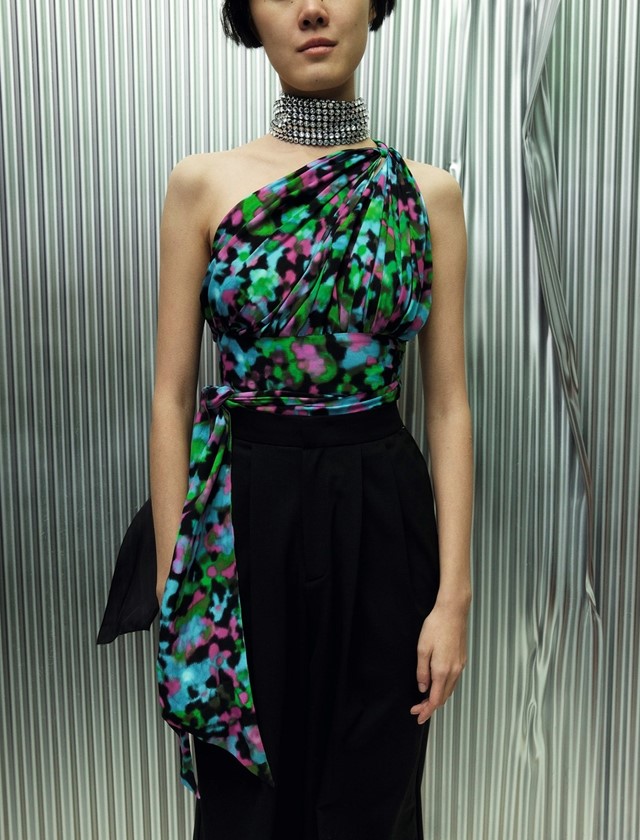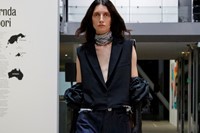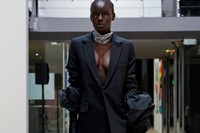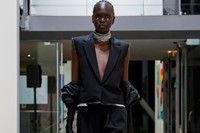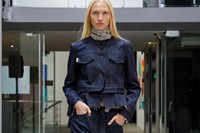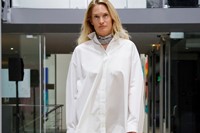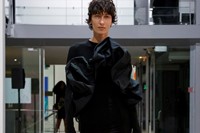Although Alber Elbaz died just three months after AZ Factory’s official unveiling, the label withstands as one of fashion’s great experiments. Here, Lutz Huelle talks about being the third designer to create a collection for them
This article is taken from the Spring/Summer 2023 issue of AnOther Magazine:
At first glance there isn’t much to connect the aesthetic of the designer Lutz Huelle with that of Alber Elbaz, who died in April 2021. Elbaz was noted for clothes that drew inspiration from couture techniques, designing for a triumvirate of French fashion houses across a career spanning 25 years. He worked most famously for the house of Lanvin between 2001 and 2015, after a period at Guy Laroche and a brief but lauded stint designing ready-to-wear for Yves Saint Laurent, where he was the founder’s choice of successor. He trained as assistant to the famously fastidious Geoffrey Beene in New York. Huelle, meanwhile, trained at Central Saint Martins, graduating in 1995; after his studies he joined the studio of Martin Margiela, during arguably the label’s most revolutionary and influential period. The notion of recycling, central to Margiela, finds reflection in Huelle’s work for his namesake label, presented to critical acclaim and underground success during Paris Fashion Week since February 2000. He rips apart old jeans for their denim and integrates existing garments into new ones; even his show invitations are printed on vintage EP covers. If Elbaz’s Lanvin was frequently compared to haute couture, Lutz Huelle is resolutely lo-fi. During the pandemic, Huelle even made videos showing viewers how to chop up T-shirts to make them into fancy evening tops.
Mention that to Huelle and he’ll laugh. He knows that, on paper, he is an unexpected recruit to continue Elbaz’s legacy. But that is precisely what he was tasked to do last summer by AZ Factory, named after the first and last letters of the designer’s name, a project that Elbaz himself called a “reset”. It was a great fashion experiment that Elbaz didn’t see come to full fruition. “One idea of Alber’s was to use this as a factory – for friends, he called them amigos, to come in and do different collections,” Huelle says in his soft native German accent, which persists despite the fact he has lived in Paris since the late Nineties. “It’s seeing fashion in a different, much more democratic way.” Although Elbaz died just three months after AZ Factory’s official unveiling, the label continued with his plan as a solution to finding an identity for a young brand without its founding creative director.
For all their apparent differences, Huelle was part of that plan. “When I came to the company for the first time and met the team, they told me that during Covid, when I did those T-shirt tutorials, Alber watched them all,” Huelle recalls. “It was his idea to get me involved. I didn’t know he had taken any notice. But he said, ‘Lutz gets it.’ I was very emotional when I heard that.”
As a child, Huelle’s interest in fashion was initially part of something far wider. “I was always interested in popular culture, anything that could make my life feel more interesting than it was,” he says now. “I come from a small town in Germany, there wasn’t that much to do – it was an industrial place.” He was born in 1966 and raised in Remscheid, in what was then West Germany; his parents had standard hopes that he might work in a bank or become a footballer. But Huelle began to experiment with clothes as a teenager, assembling outfits inspired by the musicians who shaped his adolescence. Feeling an affinity between that transformative power of clothing and the work of British designers, he moved to study in London and styled his hair into a mohican accordingly.
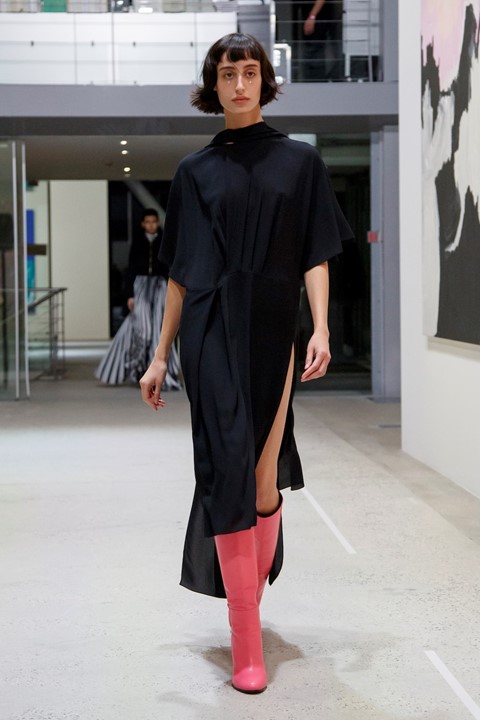
There’s also, somehow, a connection with Elbaz there – who often spoke of his own struggles with self image, specifically weight, as a motivation for creating clothes that were transformative: light, weightless even. To hark back to Huelle’s pandemic experiments, Elbaz’s cocktail dresses, free of corsetry, often had the feel of a T-shirt. There are other similarities to be found – a love of rawness and spontaneity, leaving hems to unravel and minimising construction. In recent seasons at Lutz Huelle, its founder has been tacking great swathes of taffeta onto T-shirt shapes, using the fabric to create ballooning cuffs or volant hems that sit halfway between Fifties haute couture and Eighties sportswear. Elbaz adored volumes like that. He liked sparkle, as does Huelle – the dumb glamour of diamanté and sequins, chafing at the confines of good taste.
All of those affinities could be seen marching through the Fondation Cartier in Paris in October, with major works of contemporary art as their backdrop. The location, however, wasn’t about grandeur – it was chosen because the AZ Factory studio sits on the floor above the exhibition space and so represents the heart and soul of the operation. Huelle is the third Amigo to create a collection for AZ Factory, having been preceded by Thebe Magugu and Ester Manas. But his was the label’s first show – bar the one titled Love Brings Love, devised by Elbaz’s partner, Alex Koo, as a gargantuan celebration of the designer’s life, held in October 2021. For that fashion extravaganza, more than 40 designers created one-off homage pieces – Anthony Vaccarello dressed Anja Rubik as an Alber avatar; Olivier Rousteing created a dress scribbled with an Elbaz drawing; Jean Paul Gaultier’s was made of velvet hearts.
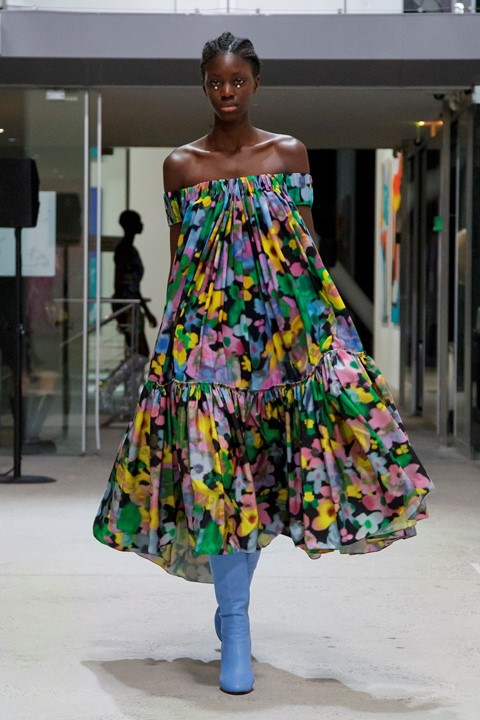
Huelle himself only met Elbaz twice. “There was something that was so human, and he was very easy to talk to,” Huelle says. “It didn’t surprise me because his work always had that … he liked people. There was something about him that was inviting.” And he states that, after the 2021 blow-out, AZ Factory didn’t want an homage to Elbaz from him. “They said, ‘Do your own work, but do it so it corresponds with Alber’s vision, or his values.’ So instead of looking at Alber’s work, saying, ‘I’m going to use this, this and this,’ I thought more about friends, about generosity.”
Huelle also says, emphatically, that he wouldn’t want to tackle Elbaz’s back catalogue. “Because who can? Nobody can get to what he did and shouldn’t try. It was his identity. It was a collection for myself, with the idea of Alber in mind.” He smiles. “It’s not what he would have done, but I hope it’s what he would have liked.”
This story features in the Spring/Summer 2023 issue of AnOther Magazine, which is on sale now. Order here.
